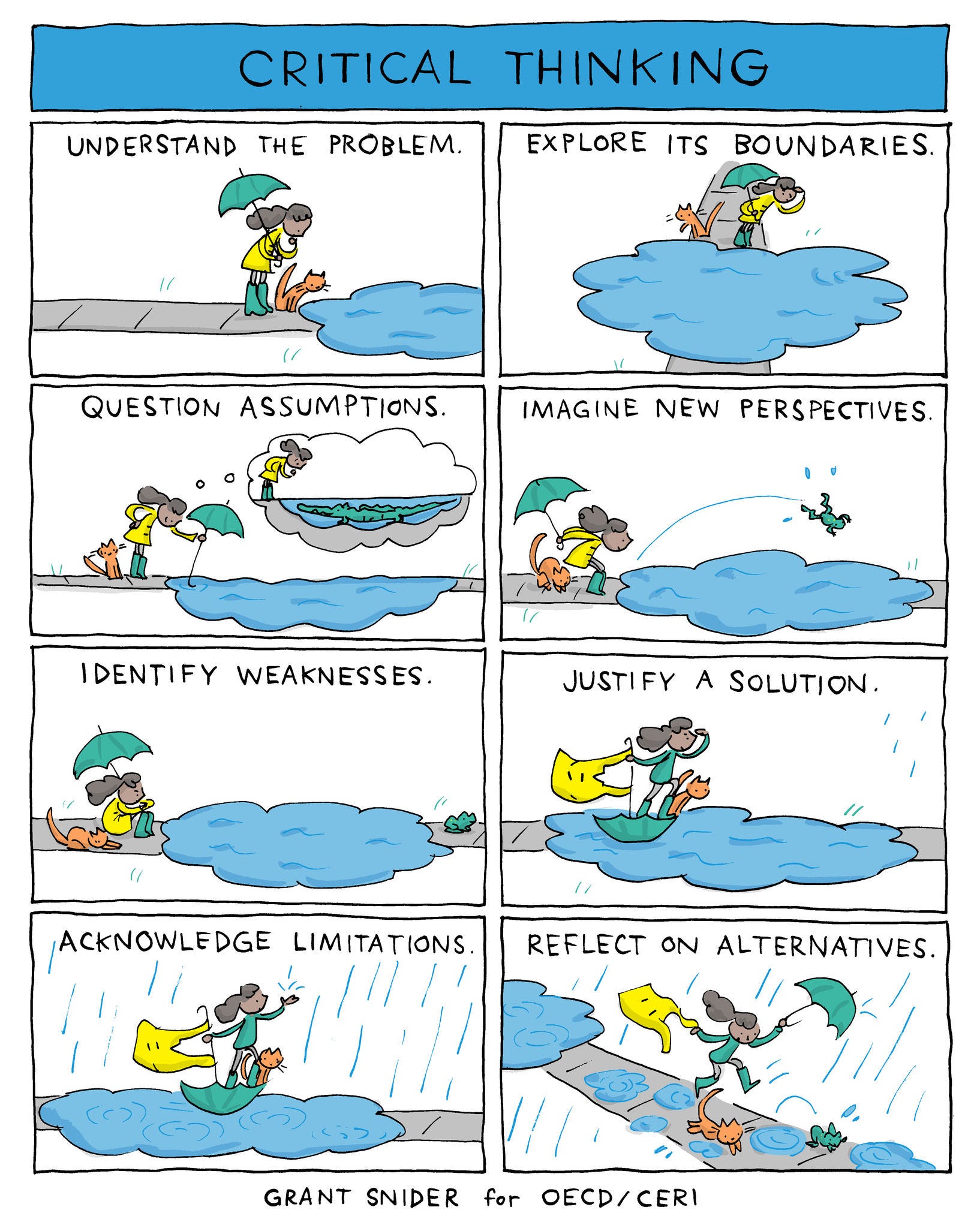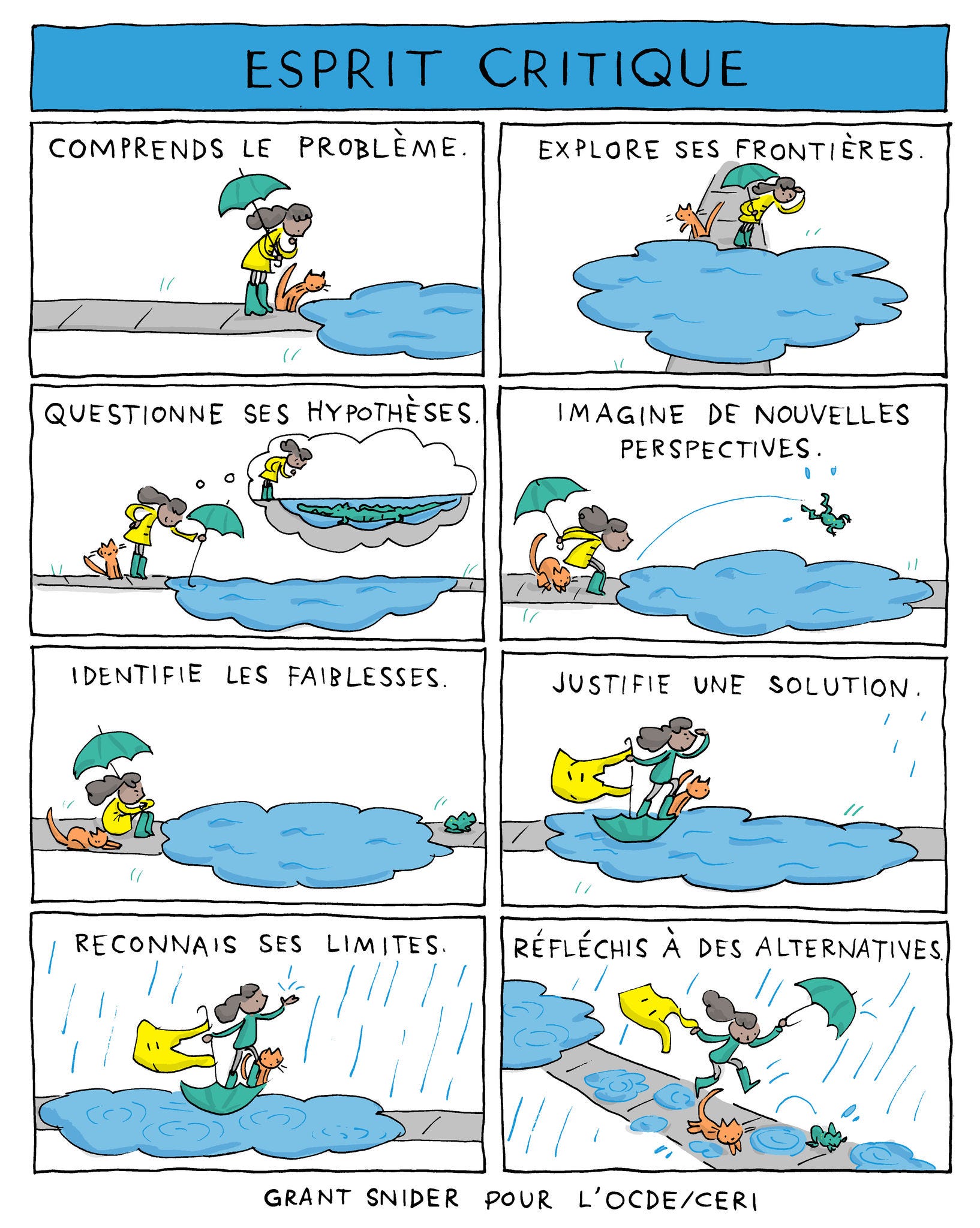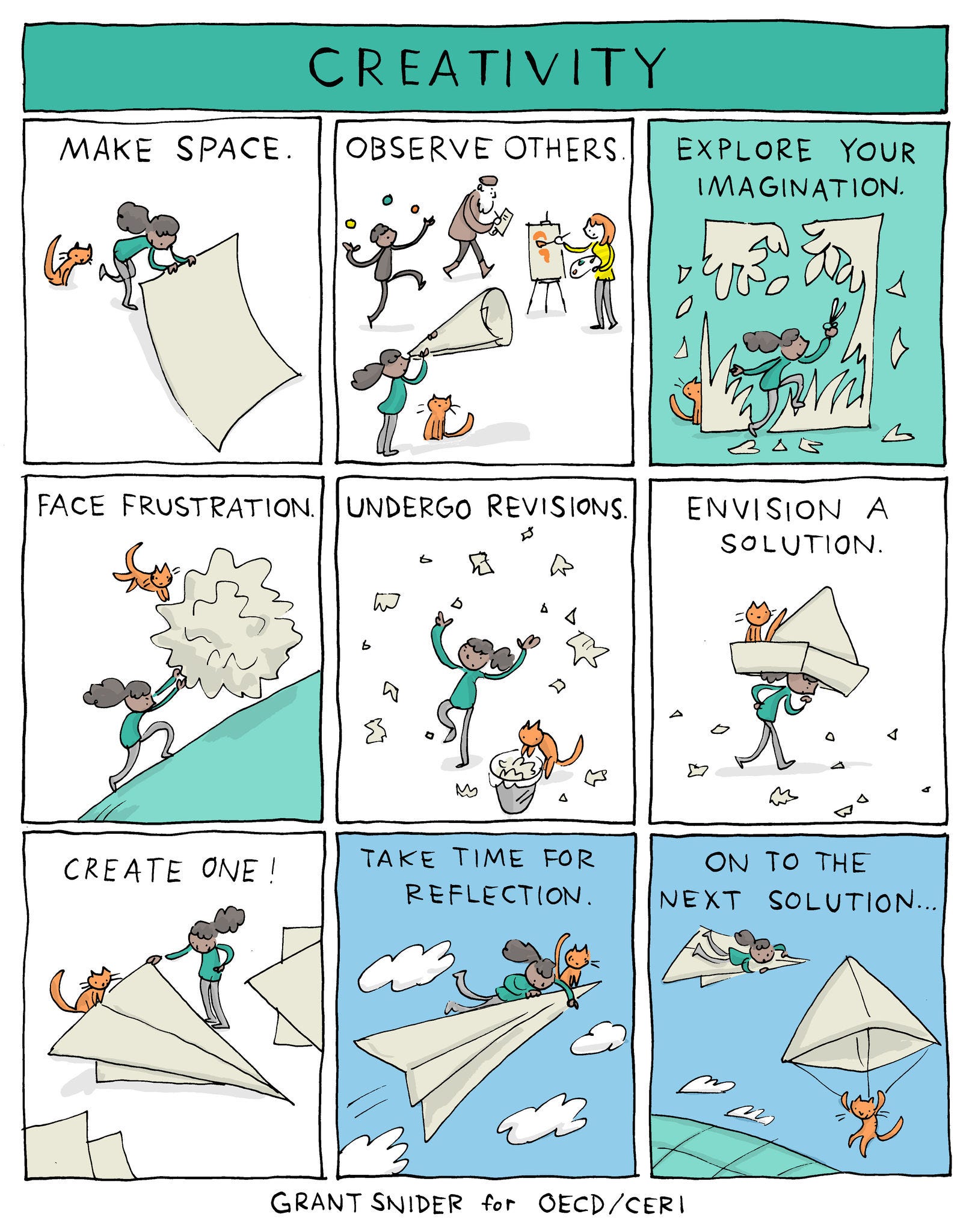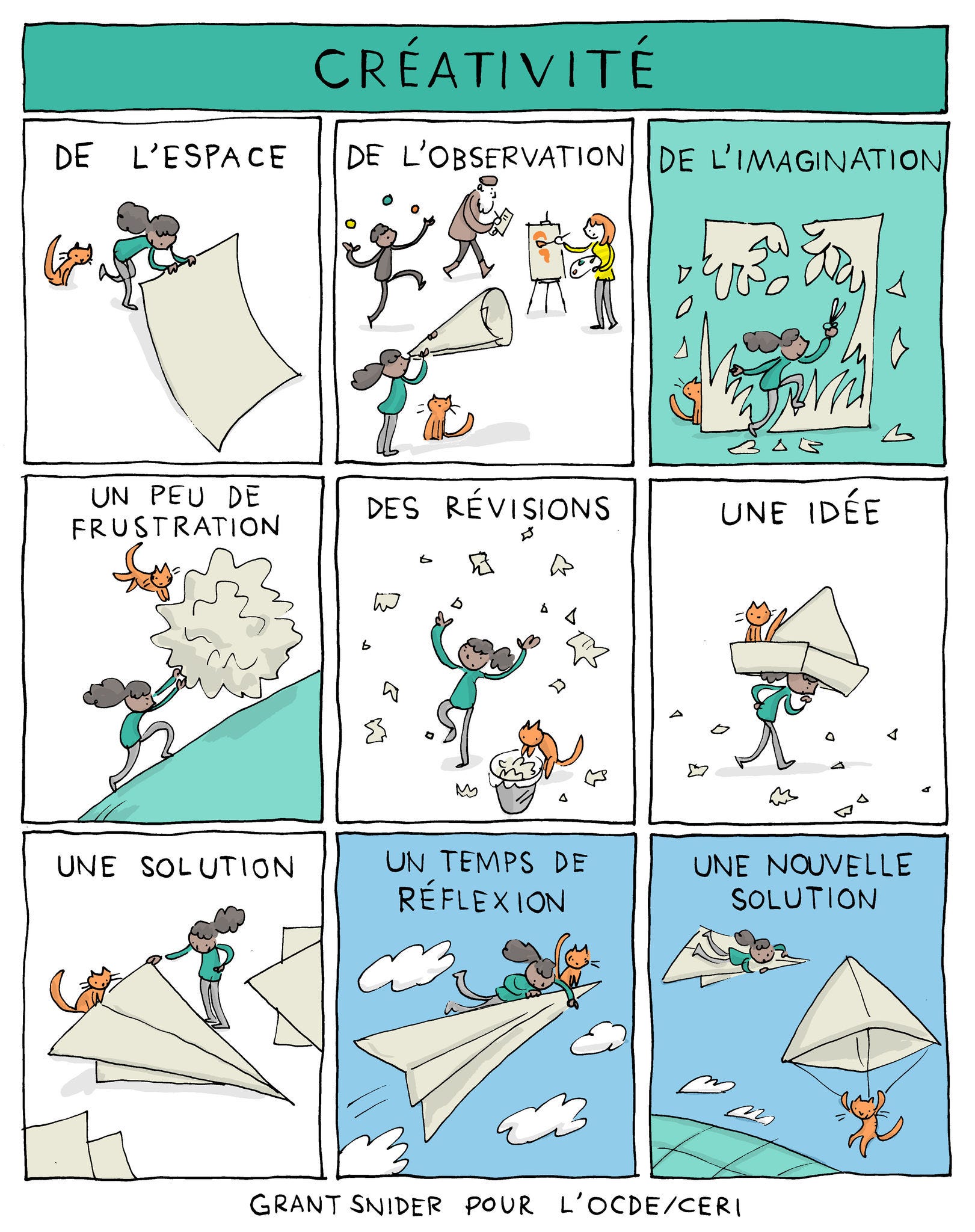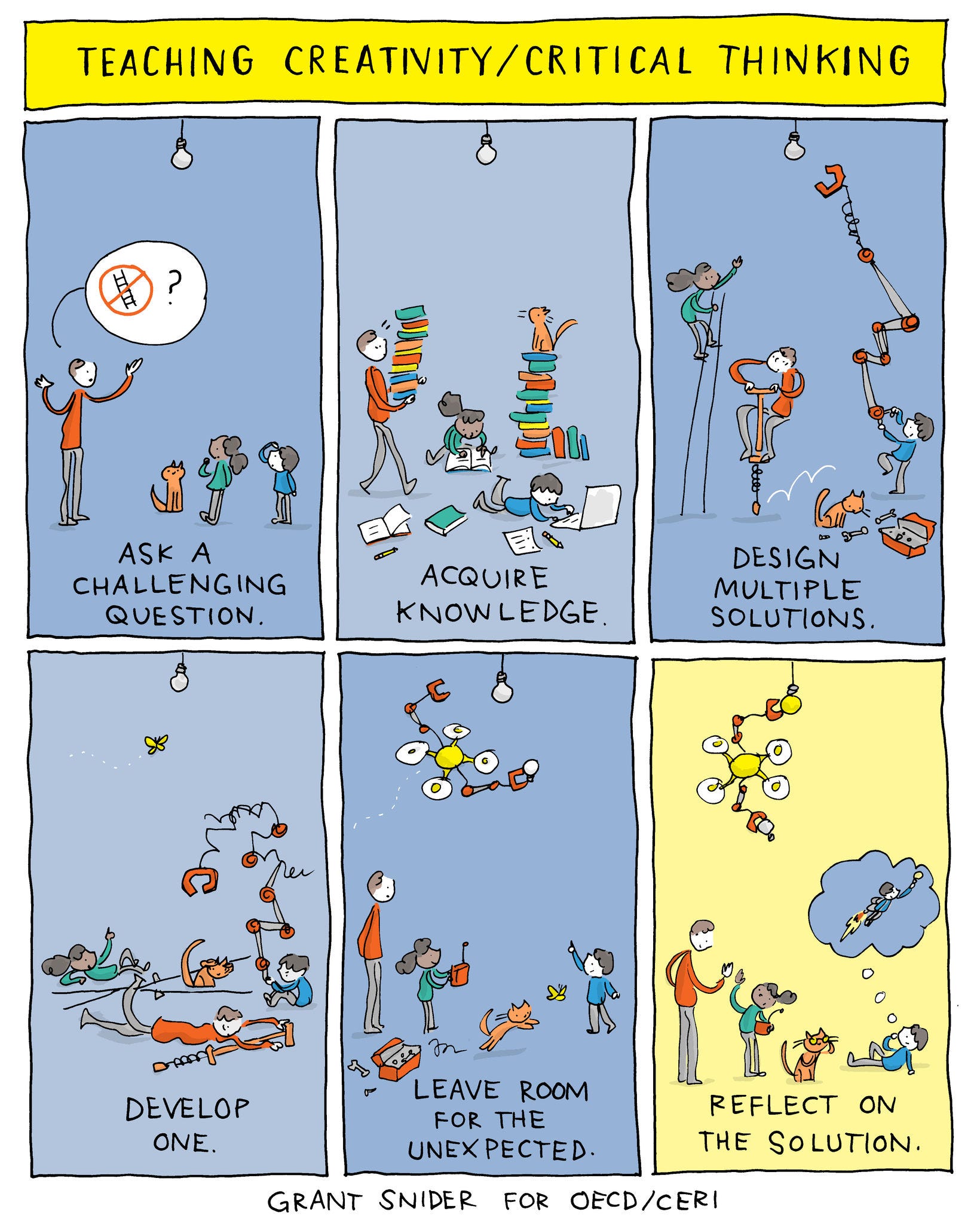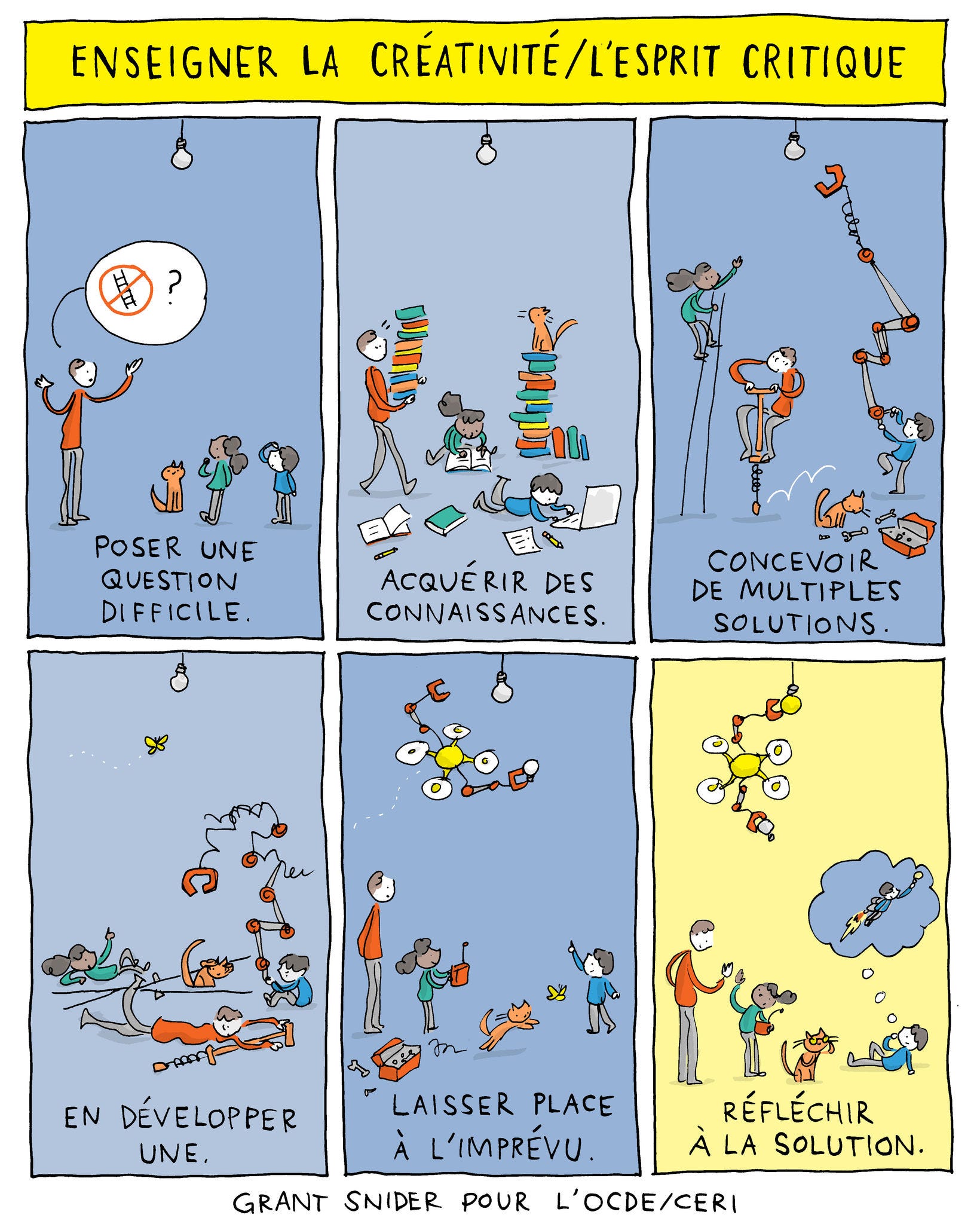The project explores new approaches to equip people with the skills required for innovation and to support radical innovation and continuous improvement in education systems.
Teaching, Learning and Assessing Creative and Critical Thinking Skills
Creativity and critical thinking prepare students for innovative economies and improve wellbeing. However, educators often lack guidance on how to equip students with creativity and critical thinking within subject teaching. Education systems have likewise rarely established ways to systematically assess students’ acquisition of creativity and critical thinking.
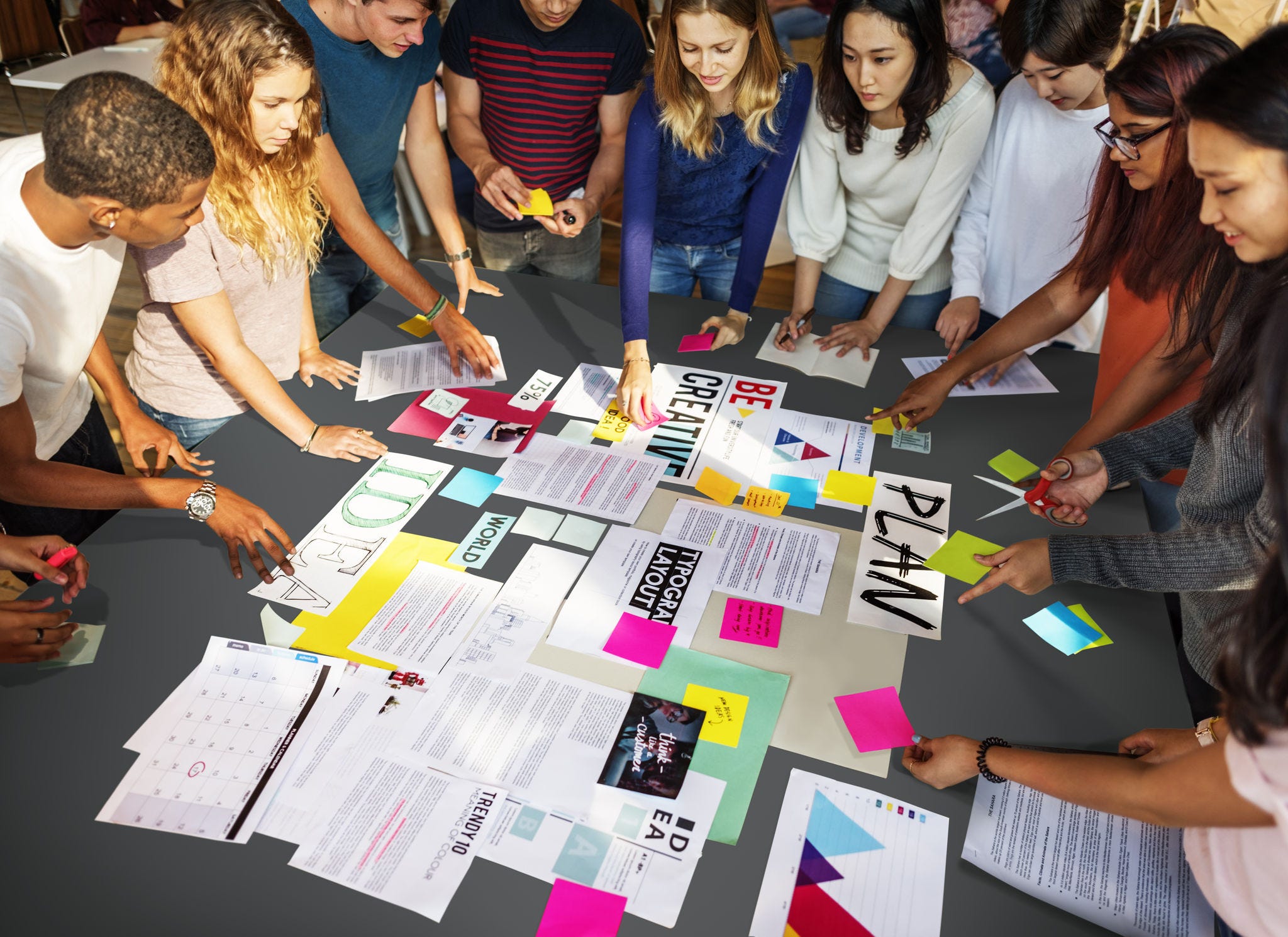
About
Objective
Creativity and critical thinking are key skills for the complex and globalized economies and societies of the 21st century. There is a growing consensus that education systems and institutions should cultivate these skills with their students. However, too little is known about what this means for everyday teaching and assessment practices.
This project at the OECD Centre for Educational Research and Innovation (CERI) aims to support education institutions to innovate in their teaching and nurture students’ creative and critical thinking.
The project builds an international community of practice around teaching, learning and assessing creativity and critical thinking. It seeks to identify the key contextual factors and effective approaches to foster these skills in education settings, develop and implement example instructional practices and assess the effects of innovative pedagogies on students and educators
.The project works across primary, secondary and higher education. It includes a strong focus on initial teacher education and continuing professional learning.
Method
Networks of institutions and educators experience professional learning and change their teaching to more explicitly develop students’ creativity and critical thinking along with disciplinary content and skills.
This redesign of teaching relies on a shared definition of creativity and critical thinking made visible through a common international rubric. Beyond this common goal, institutions and educators preserve full pedagogical freedom.
The OECD developed a monitoring system to assess the impact of re-designed teaching using both quantitative and qualitative data. Questionnaires were designed to measure the progression of related skills, beliefs and attitudes.
Questionnaires are also administered to control groups for comparison and to better evaluate the outcomes of the pedagogical changes. Qualitative data collection based on interviews, focus groups and observations, complements the quantitative data to provide comprehensive evidence of the effects of the different pedagogies tested.
Participating countries and institutions
Countries (Primary and Secondary education)
- Brazil
- France
- Hungary
- India
- The Netherlands
- Russian Federation
- Slovak Republic
- Spain
- Thailand
- United States
- United Kingdom (Wales)
Institutions (Higher Education)
- Monash University - Australia
- Ontario Tech University - Canada
- McGill University - Canada
- University College Copenhagen - Denmark
- Aalto University - Finland
- NISE (University of Limerick + Mary Immaculate College) - Ireland
- Politecnico di Torino - Italy
- Sophia University - Japan
- International Christian University - Japan
- KEDI (national coordinator) - Korea
- Universidad de Guadalajara - Mexico
- Universidad Pedagogica Nacional - Mexico
- Shanghai Normal University - People's Republic of China
- Northeast Normal University - People's Republic of China
- Central China Normal University - People's Republic of China
- Escola Superior de Saude de Santa Maria - Portugal
- Instituto Politécnico de Viana do Castelo - Portugal
- Tecnico Lisboa (Lisbon University) - Portugal
- Universidade Lusófona de Humanidades e Tecnologias - Portugal
- University of Porto - Portugal
- Universidade de Aveiro - Portugal
- Universidade de Trás-os-Montes e Alto Douro - Portugal
- Politecnico de Leiria - Portugal
- Universidad Camilo Jose Cela - Spain
- University of Winchester - United Kingdom
Project outputs
Rubrics
Conceptual rubrics
ASSESSMENT RUBRICS
Class friendly assessment rubric creativity (available in spanish/español)
Class friendly assessment rubric critical-thinking (available in spanish/español)
Design criteria
Lesson plans
- Musical poetry (version with adaptatation for online teaching)
- Create a movie Score
- Haiku composition
- Discover the sounds of your school SECONDARY
- Discover the sounds of your school PRIMARY
- Folk song with word chains
- Scotland's burning song revision
- Making music without instruments: sounds from water
- Body percussion
- Shoes as musical inspiration (version with adaptatation for online teaching)
- Harry Potter Ostinato
- Symbolic Self Portrait
- The Duke of Lancaster: a graffiti case-study
- Graffiti art Styles, iconography and message
- Graffiti Perceptions and historical connections
- Integrity in art
- Curate your own exhibition
- The world through the eyes of colour
- How can everyday objects and living beings become art
- Attachment and junk challenge
- Painting with tape
- Hybrid creatures of the subconscious
- Memory maps
- Perspective in drawing and beyond
- Useless object redesign
- Glow in the dark: design a multi-functional product
- Building buildings
- Revitalizing the school environment with Modern Art
- The Mystery of the Disappearing Water
- Should we replace our power station
- Rivers full of Water
- When is a Mammal not a Mammal
- Ant Communication
- Molecules-workshop
- Forces and Motion
- What Controls My Health (version with adaptatation for online teaching)
- Evaporative-Cooling (version with adaptatation for online teaching)
- Dynamic Earth: How is this place on Earth going to change over 10, 100, 1 000, 10 000, and 1 000 000 years?
- How can we help the birds near our school grow up and thrive?
- Why do I see so many squirrels but I can’t find any stegosauruses?
- How to classify an alien
- 3D printing
- Cells on t-shirts
- Negative climatic events
- Building ecosystems
- Animal cell creation
- Prepare for a natural disaster
- How is human activity and carbon dioxide in the atmosphere changing our oceans?
- How we can prevent a chocolate bar from melting in the sun?
- Does Rubbish disappear?
- If fire is a hazard, why do some plants and animals depend on fire?
- What makes a good environment for fungi? How do fungi make a good environment for us?
- How do farmed animals affect our world?
- When are rain events a problem for people, and what can we do about them?
- London Bridge is Falling Down
- Mathematics for a new Taj Mahal (version with adaptatation for online teaching)
- How happy are we (version with adaptatation for online teaching)
- Create a lesson for the year above
- How much will the school trip cost
- The math-mystery of the Egyptian Pyramids
- A world of limited resources
- The probability games
- The pie of life
- How can I use mathematics for painting?
- Paper airplanes
- Geometrical architecture and artwork
- Improving sport performance with maths
- Cutting and enlarging art
- Refresher bomb
- Should this be in the Guinness book of records?
- The great cookie bake
- Crime scene investigation
- Area of a dream place
Professional learning resources
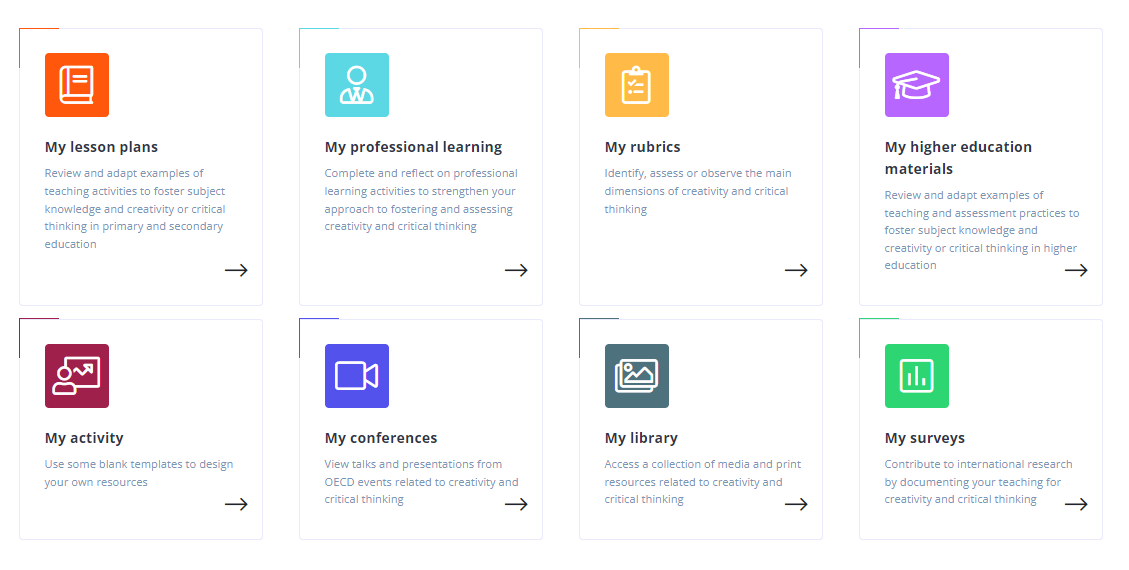
Main publications
-
 31 October 2022
31 October 2022 -
 15 March 2022
15 March 2022
All publications
Primary and Secondary Education
What are the key elements of creativity and critical thinking? What pedagogical strategies and approaches can teachers adopt to foster them? How can school leaders support teachers' professional learning?
To what extent did teachers participating in the project change their teaching methods? How can we know whether it works and for whom? These are some of the questions addressed in this book, which reports on the outputs and lessons of this international project.
In an age of innovation and digitalization, creativity has become one of the most valued skills in the labor market. This brief shows how policymakers and teachers can empower students to innovate and improve their education by developing students creativity.
by Stéphan Vincent-Lancrin
Critical thinking has become key to the skill set that people should develop not only to have better prospects in the labor market, but also a better personal and civic life. This brief shows how policymakers and teachers can help students develop their critical thinking skills.
by Stéphan Vincent-Lancrin
Do girls and boys report different feelings during teaching and learning for creativity and critical thinking? This document highlights differences between the emotions reported by male and female secondary students in a project about fostering creativity and critical thinking run by the Centre for Educational Research and Innovation at the OECD.
The paper suggests a theoretical underpinning for defining and assessing creativity along with a number of practical suggestions as to how creativity can be developed and tracked in schools.
by Bill Lucas, Guy Claxton and Ellen Spencer
This paper presents the research protocol of the project of school-based assessment of creative and critical thinking skills of the OECD Centre for Educational Research and Innovation (CERI).
by Stéphan Vincent-Lancrin
Higher Education
This scoping review examines the effectiveness of online and blended learning in fostering higher-order thinking skills in higher education, focussing on creativity and critical thinking. The paper finds that whilst there is a growing body of research in this area, its scope and generalisability remain limited.
by Cassie Hague
This paper reviews existing policies and practices relating to the assessment of students’ creativity and critical thinking skills in higher education across OECD countries.
by Mathias Bouckaert
This paper focuses on ways in which students’ creativity and critical thinking can be fostered in higher education by contextualising such efforts within the broader framework of academics’ professional learning.
by Alenoush Saroyan
There is a discernible and growing gap between the qualifications that a university degree certifies and the actual generic, 21st-century skills with which students graduate from higher education. By generic skills, it is meant literacy and critical thinking skills encompassing problem solving, analytic reasoning and communications competency. As automation takes over non- and lower-cognitive tasks in today’s workplace, these generic skills are especially valued but a tertiary degree is a poor indicator of skills level.
Conferences and session replays
Creativity in Education Summit 2024 (Paris, 17-18 October 2024)
The 2024 Creativity in Education Summit on "Empowering Creativity in Education via Practical Resources" is a premier gathering designed to address the critical role of creativity in shaping the future of education. Co-organised by the OECD, UNESCO anf the Global Institute of Creative Thinking.
Materials shared during the Summit are available here: DAY 1 - DAY 2
Recordings of the sessions will be made available before the end of 2024.
For more information about the event, you can check the website.
The Creativity in Education Summit 2023 was the stage for the launch of the OECD’s Professional Learning framework for fostering and assessing creativity and critical thinking, an initiative that seeks to enhance the teaching of creative and critical thinking skills in schools internationally.
Watch the recordings of the sessions at this link.
Material:
- 23 November 2023 - all sessions
- 24 November 2023 - morning sessions
- 24 November 2023 - afternoon sessions
Read the brochure about the conference and its highlights.
The conference took place at the innovation foundation nesta and it brought together policy makers, experts and practitioners to discuss the importance of creativity and critical thinking in OECD economies and societies – and how students can acquire these skills in school.
Rewatch the videos and the interviews at this link.
Check the agenda, the bios of the speakers and the presentations.
Sessions replay
CREATIVITY IN EDUCATION SUMMIT 2023
CREATIVITY AND CRITICAL THINKING SKILLS IN SCHOOL: MOVING A SHARED AGENDA FORWARD
Webinars
Evaluating ideas: navigating an uncertain world with critical thinking
Playing with ideas: Cultivating student creativity, innovation and learning in schools
Embedding creativity in education: Ireland’s whole-of-government approach
Teaching, learning and assessing 21st century skills in education: Thailand’s experience
Empowering students to innovate:India's journey towards a competency-based curriculum
Why and how schools should nurture students' creativity
Engaging boys and girls in learning: Creative approaches to closing gender gaps
Contact us
For any information about the project, you can contact via email Stéphan Vincent-Lancrin (Project lead), Cassie Hague (Analyst) and Federico Bolognesi (Project Assistant).





